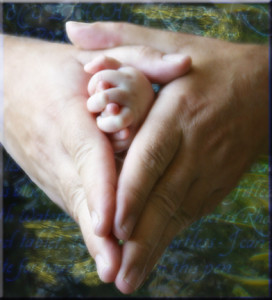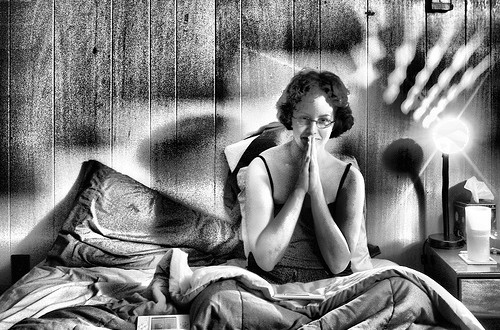by Michelle Sutton-Kerchner
Afford yourself time to be grateful and you may enjoy a better night’s rest …
Imagine the thrill of discovering you may not need to “waste” more time sleeping to feel rested. A simple attitude adjustment could help do the trick.
We kicked off the month by gaining an extra hour with the end of Daylight Savings Time. Many took the pleasure of donating this time to sleep, not difficult since the hour technically arrived at 2am. If the extra hour was added mid-afternoon or any other time of day, it is a safe assumption it would be worked away.
We live in a society that does not value sleep. It is embarrassing to be caught “in the (implied lazy) act” of sleeping late or taking a quick nap. Yet, what if we considered all the good the body accomplishes during sleep. Sleep is productive.
While we rest, our bodies are busy fighting everything from common colds to cancer. It’s a time to repair exercised muscles; reduce mental stress; and regulate body chemistry, hormones, and blood levels. Spend a day sleep deprived and notice how your production level drops. Now, who is being lazy!
Countless research proves the health benefits of sleeping. Use this reminder as a permission slip to go to bed at a reasonable time. Heroes wear capes, not bags under their eyes. And well-rested heroes have the stamina to live healthy.
Cancer Prevention
 At some point, everyone has fought off a cold with a little extra sleep. The results are immediately apparent. However, new findings indicate long-term health gains from good sleep, including the ability to ward off diseases. Scientists are discovering how sleep can help prevent certain cancers. It also can lessen the aggressiveness of cancers already underway.
At some point, everyone has fought off a cold with a little extra sleep. The results are immediately apparent. However, new findings indicate long-term health gains from good sleep, including the ability to ward off diseases. Scientists are discovering how sleep can help prevent certain cancers. It also can lessen the aggressiveness of cancers already underway.
One study found men who struggled to fall, and remain, asleep were up to two times more likely to develop prostate cancer. Further, the degree of cancer risk was directly related to the severity of sleep issues. Women who slept six hours or less nightly had a 62 percent increased risk of breast cancer. For breast cancer patients, aggressive tumors were more likely in those who slept under six hours nightly.
Researchers attribute the connection between cancer prevention and sleep to melatonin production. Although still theoretical, the hormone melatonin is produced at night to help regulate sleep and wake cycles. Some studies show the hormone also helps fight disease by blocking cellular processes that trigger the growth of cancer cells.
Diabetes Risk
Diabetes and poor sleep are cyclical. Evidence indicates lack of sleep can cause the body to enter a pre-diabetic state. For those who have diabetes, sleep difficulties are a common symptom, mostly from frequent urination disruptive to sleep.

Sleep deprivation can impair glucose tolerance and reduce insulin sensitivity. In only three night’s time, lack of sleep increased the risk of type 2 diabetes in study participants by lessening insulin sensitivity. This short period of poor sleep had the same impact on insulin sensitivity as would gaining 20 to 30 pounds. (That isn’t permission to gain a bunch of weight in the name of more time to sleep.)
Even without the presence of diabetes, lack of sleep affects blood sugar levels. In a desperate search for energy, the sleep-deprived often turn to sugar and carbs. Although the spike in blood sugar gives a quick rush of energy, the crash leaves you feeling worse.
The body reacts to sleep loss in much the same way it does to insulin resistance. Cells do not efficiently use glucose, which results in high blood sugar. Ongoing elevated blood sugar levels cause organ damage, a common effect of untreated diabetes.
Weight Gain
If those 1,000 ab crunches are not getting results, you may need to think about sleeping it off! Inadequate sleep can lead to poor eating habits and an overall decline in health. Chronic sleep deprivation, defined as five or less hours of sleep in a 24-hour period, is associated with weight gain. A strong connection is being made between sleep and obesity.
Sleep deprivation can increase hormone levels that trigger hunger while simultaneously lowering levels that help maintain willpower. Hence, the sleep-deprived hunger easily and have trouble resisting food—a sabotage to any diet.
Sleep also affects metabolism. Hormones related to metabolism are replenished during sleep. They regulate metabolism to be efficient in calorie burning. Poor sleep can result in a slower metabolism, which increases the likelihood of weight gain. The sleep-deprived’s tendency to crave foods high in fat and sugar exacerbate this situation.
A state of fatigue also does not help the fitness cause. While overloading on comfort foods and short-term energy, you probably aren’t motivated to hit the Exercise Floor. Although exercise is often the best remedy to sleepiness, people tend to use the first yawn as an excuse to skip a workout. Instead, on tired days, try to accomplish light exercise to make the most of waking hours. Physical activity delivers a jolt of energy to help keep you going until bedtime.
Increase your sleep time to the standard seven to eight hours nightly. Along with better health, you may find yourself dropping unwanted weight. Aside from the direct impact sleep deprivation has on weight, indirectly, you will be awake less hours. No matter how adept at eating on-the-run, our culture has not found a way to munch while snoozing. Maybe a little extra shut-eye is just what the body is craving.
Depression
Lack of sleep also affects emotions, specifically related to episodes of depression. Studies show the impact quality and quantity of sleep has on mental state. Sleeping regulates the production of endorphins, which can act as natural “pain-killers,” and serotonin, which affects mental outlook. Depression and anxiety, which may have been triggered by sleep deprivation ,often interfere with the ability to sleep. This vicious cycle can lead to insomnia and other health issues.
Feelings of sadness, depression, or irritability often send people to the fridge– and not for the veggies. The resulting increase in caffeine and poor food choices affects more than body weight. It also impacts emotional well-being, further spiraling mood.
Maximize Your Sleep

Daily exercise assures better quality of sleep, which is as important as quantity. The expenditure of energy through a regular fitness routine allows a deeper sleep, which is more refreshing. It’s also restorative. Research proves moderate exercise for at least half-hour, seven days per week, has the best outcome for a good night’s rest.
Aerobic exercises, which increase the amount of oxygen in the bloodstream, are best for combating restless nights. Cycle, dance, Zumba, swim, hit the treadmill. Pump up the cardio. Pump up your heart rate on the Exercise Floor for a more restful state at bedtime.
The goal of exercising for better sleep is to produce healthy physical stress. The brain responds to this healthy exhaustion by increasing time spent in the deepest stage of sleep. You can’t always guarantee the optimum hours of rest; however, enjoyable, replenishing sleep can be possible during the hours you do manage.
Go Down Grateful
Sleep allows the body to multitask for many healthy outcomes. It seems being grateful also has a multi-dimensional effect. Living in a state of thankfulness invites wellness to dwell within us. Nourish yourself with gratitude. True resilience, the stuff that gets us through life, requires acknowledgement of what we are given. According to research, it also helps us sleep!
 Researchers assessed 186 men and 215 women (40 percent of whom had clinically impaired sleep), and measured their level of gratitude, their quality of sleep, and their personality. Those whose pre-sleep thoughts were more positive experienced better sleep quality. Dozing off in a state of gratitude led to improved quality and quantity of sleep, with less time needed to fall asleep. They also had less daytime dysfunction, likely a combination of better sleep and a carry-over of thankful thinking.
Researchers assessed 186 men and 215 women (40 percent of whom had clinically impaired sleep), and measured their level of gratitude, their quality of sleep, and their personality. Those whose pre-sleep thoughts were more positive experienced better sleep quality. Dozing off in a state of gratitude led to improved quality and quantity of sleep, with less time needed to fall asleep. They also had less daytime dysfunction, likely a combination of better sleep and a carry-over of thankful thinking.
Cultivating gratitude helps create optimism and satisfaction. It deflects our minds from that which may be missing in life and refocuses on the good that surrounds us. Frustrations and disappointments fade, which allows inner-peace, contentment, and the ability to lay down one’s head with knowledge of all you truly possess.
When the alarm sounds, you’ll stretch awake with a smile. Grateful again, this time for replenishing sleep and the good health it nurtures.
Sources
Breast Cancer Research and Treatment
“Feel Grateful, Sleep Better!” by Elizabeth Scott at www.about.com.
“Sleep and Weight Gain,” by Denise Mann at www.webmd.com.
“Sleep: The Experts Weigh In,” by various physicians, at www.everydayhealth.com.
www.webmd.com.
Image Credits
Gratitude and sleep (introductory photo): http://www.flickr.com/photos/striatic/264701517/
Cancer ribbons: http://www.flickr.com/photos/cheryljns/2135545942/
Sugar cubes: © Alex Fairest at www.dreamstime.com.
Multi-generation workout: www.monkeybusinessimages at www.dreamstime.com.
Prayer hands: Artwork from redfern.biz via http://www.flickr.com/photos/redfernstudio/8028361767/
 Fitness & Wellness News Your Source for Fitness News, Wellness News, Health News, and Nutrition News!
Fitness & Wellness News Your Source for Fitness News, Wellness News, Health News, and Nutrition News!




